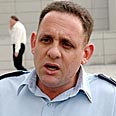
Evacuation of wounded in Lebanon – 3.5 times longer that routine
Data presented at national conference for Aerospace Medicine show that during recent war in Lebanon evacuation of casualties took average of 3.5 hours. IAF medical commander explains: Data reasonable because in wartime evacuations more complex, carried out under threat
According to Colonel Erez Birenboim, the air force medical commander, the standard time for an evacuation is typically less than one hour.
“You can’t analyze war evacuations in comparison with standard missions,” Birenboim explained the time discrepancy. “It’s a different task, and you’re dealing with a different variety of threats. During war, evacuations are much more complex and the numbers are higher – thus the data received definitely make sense.”
.jpg)
Evacuation of wounded during war (Photo: Doron Golan)
An analysis of the characteristics of the evacuations found that during the war each sortie evacuated an average of 4.5 soldiers, compared to the 1.2 wounded soldiers per sortie in routine evacuations in Gaza and the West Bank. Further, it was found that the Air Force carried out 94 evacuations in which a total of 332 casualties and 16 dead were evacuated.
During the conference an issue that arose frequently during the war was discussed: The army’s debate over whether to evacuate a smaller number of casualties and provide them thorough treatment, or evacuate all the wounded with the foreknowledge that some would not be able to get the necessary care.
Air Force doctors who deliberated the issue noted that “the large number of casualties in each helicopter required special preparation of the medical staff and created real restrictions on the ability to provide effective care.” It should be noted that during the war no wounded soldier died during an evacuation sortie.
The Air Force has already begun designing training programs in which medical teams will have to treat a large number of wounded at once, as a lesson from the Lebanon war.
Birenboim explained that although in the recent war evacuation times were longer than in Operation Peace of the Galilee in 1982, the data indicates superior operation on the part of medical teams in the recent war.
“Remember that the characteristics of the evacuations during Operation Peace of the Galilee were completely different from those in south Lebanon,” Birenboim noted. In 1982, he said, fighting occured in areas more accessible to helicopters, "and in light of the threats in the recent war, the data are excellent, especially compared to the Americans in Iraq, who are also operating in areas under threat.”










